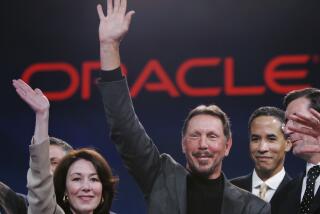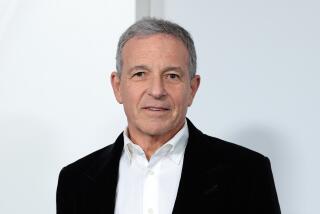Witness Faults Disney Board in Ovitz Case
- Share via
GEORGETOWN, Del. — A law professor Wednesday gave Walt Disney Co.’s board of directors a failing grade for allegedly letting Chief Executive Michael Eisner have a free hand in the ill-fated hiring of his friend Michael Ovitz as president.
In the first day of a closely watched trial, Duke University professor Deborah DeMott said Disney’s board had failed to scrutinize both Ovitz’s hiring in 1995 and his dismissal -- with a $109-million severance package -- 15 months later.
DeMott said the full board didn’t screen Ovitz’s employment contract before he was hired, adding that the board breached good governance practices and may have violated company bylaws.
“I saw no indication that the selection of Mr. Ovitz was preceded by a meeting of Disney’s board of directors,” DeMott testified.
She was the first of three expert witnesses scheduled to be called by lawyers representing Disney shareholders in Delaware Chancery Court. The shareholders allege that Disney directors acted as a rubber stamp for Eisner when he hired Ovitz as his second in command. They are seeking to recover $200 million in severance and interest.
Attorneys for Disney directors argued that board members were involved in the Ovitz hiring through one-on-one deliberations and that the company was obligated legally to pay him his severance package.
On Wednesday, the Disney attorneys grilled DeMott about her methodology and questioned her qualifications to judge directors when she has never served on a company board.
“The bottom line is we have an expert who has no board experience,” said defense attorney Jesse Finkelstein.
DeMott, an academic who specializes in corporate governance, said her testimony was based on her knowledge of the field and a review of records. She conceded that she had not interviewed Disney’s board members.
On the witness stand, DeMott said the Ovitz hiring was a significant decision for the board because of the importance of his position, the potential effect on the company’s finances and the pressure Disney was under to find a successor to Eisner.
Even so, she said, the board was not informed about key information pertaining to Ovitz. That included a decision that he would not have full operating responsibilities and that two senior executives and a major investor were opposed to Ovitz’s hiring.
When the board did meet to discuss Ovitz’s compensation, it gave only a cursory review of his employment agreement and compensation, DeMott added. Shareholders claim that the Disney board’s compensation committee spent as little as 10 minutes reviewing the agreement.
The trial, which is captivating Hollywood, is also a big event for the small town of Georgetown, perhaps best known for its Return Day event after elections, when politicians from across the state ride in a horse-drawn carriage and literally bury a hatchet.
The courtroom was crammed with 35 attorneys and their staffs, some of whom arrived in limo vans. More than a dozen journalists lined up outside the courthouse starting at 6:30 a.m. because of limited seating.
But only three local residents showed up to watch the proceedings in the morning.
“Here,” said bailiff Rocky Justice, “they don’t know Michael Eisner from a hill of beans.”
More to Read
The biggest entertainment stories
Get our big stories about Hollywood, film, television, music, arts, culture and more right in your inbox as soon as they publish.
You may occasionally receive promotional content from the Los Angeles Times.











